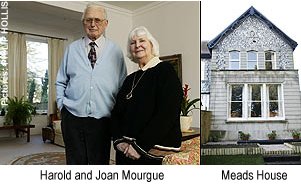| Why buy when you can just swap?
 Published
in the Daily Telegraph, 07Aug2004 Published
in the Daily Telegraph, 07Aug2004
Buying and selling a house in the conventional way is not only stressful;
it is also expensive. Much better, surely, to do a deal that cuts out the
middlemen and saves you money and grief. James Trollope reports on the
amicable alternative.
Like giving birth, buying a house often combines joy and pain. The difference
is that a midwife doesn't usually thrust a bill in front of your nose at
the end of it. That's probably why estate agents are so unloved.
 Even
if they have done a good job, they demand money at the worst time, when
you are emotionally and financially drained. So can you do without them?
In some cases, yes. The dream, agentless deal is the swap: no chain, no
commission and less hassle. But how do you pull it off? As you will see
from our two examples, you need some luck and, in the County Durham case,
divine intervention. Even
if they have done a good job, they demand money at the worst time, when
you are emotionally and financially drained. So can you do without them?
In some cases, yes. The dream, agentless deal is the swap: no chain, no
commission and less hassle. But how do you pull it off? As you will see
from our two examples, you need some luck and, in the County Durham case,
divine intervention.
Alternatively, you can use the internet. Nick Williams, from Southport,
has just set up a site (quickbeforeitsgone.co.uk) designed to introduce
houseswappers to each other. Over the coming year, he is aiming to have
more than 2,000 properties on his books. Compared to the thousands of pounds
most movers have to pay estate agents, he is asking just £5 a month.
"There will always be a role for estate agents," he says, "because there
are people who don't want to negotiate.
But there will also be a lot of people who want to save money." Peter
Bolton King, the chief executive of the National Association of Estate
Agents, sounds a warning note. "My main concern is how do you sort it out
if things go wrong? Professional help can often prove invaluable." In our
two examples, the two house-swappers not only coped without professional
negotiators, but also benefitted from a tax perk which Gordon Brown has
just withdrawn.
Until the end of last year, you had to pay Stamp Duty only on the higher-priced
property (our swappers split the bill). Patrick O'Brien, of the Inland
Revenue, explains: "The Government believes that the continuance of the
former favourable Stamp Duty treatment is not justified." Even so, if the
opportunity is there, we reckon it's still worth trying to swap.
Moving in perfect harmony
You would expect an opera singer to have a good sense of timing and
when Jozik Koc heard his cue he didn't miss a beat. On discovering that
the owner of the house his wife Helen had set her heart on hadn't himself
found a new home, he immediately offered his own place as a possible swap.
"He was very opportunistic," remembers Harold Mourgue. "He said: 'If
you're still looking, why not look here?' "
Mr Mourgue, a 76-year-old former deputy chairman of EMI, had lived,
with his wife Joan, in their splendid, 1920s, detached, mock-Tudor house
in Eastbourne for 15 years. Perched high above the coast in the fashionable
Meads district, Myton has a large garden and terrific sea views. It also
has 40 steps to the front door - a climb that Mrs Mourgue, who suffers
from arthritis and back problems, was finding increasingly difficult. Although
the Kocs lived only 300 yards away, their house was on level land and while
the garden is much smaller, the rooms are huge and, unlike Myton, neighbours
are close at hand.
Meads House is part of a "superior" development, which involved the
conversion of a Victorian hotel and some rebuilding to form an enclosed
community.
 While
the Mourgues appreciate being less isolated, the Kocs wanted more space
for their daughter, 11, and eight-year-old son. "We were the only ones
under 50," said Jozik, "and although they were lovely people we felt there
was a lack of freedom for Morwenna and Max." Rules restricting hanging
out washing and what you could do in your garden had also begun to irk. While
the Mourgues appreciate being less isolated, the Kocs wanted more space
for their daughter, 11, and eight-year-old son. "We were the only ones
under 50," said Jozik, "and although they were lovely people we felt there
was a lack of freedom for Morwenna and Max." Rules restricting hanging
out washing and what you could do in your garden had also begun to irk.
Negotiations were not quick but both parties agreed that the ability
to communicate directly was a big plus. Myton was valued at £680,000
and Meads House at £525,000, with the main saving being the shared
Stamp Duty, which cut both bills by about £10,000. Because estate
agents were involved initially, some fees were paid, although the Kocs
negotiated a reduction.
A year on, Max and Morwenna are only a short walk from their school,
where Helen teaches, and Harold and Joan Mourgue have made several new
friends. Mr Mourgue does, however, admit to missing the views. "If I was
10 years younger, I would be missing the gardening as well."
A dream come true
This house-swap in County Durham - involving a priest, an art teacher
and a recently divorced nurse - was literally a dream deal, says a mutual
friend of Linda Pitt and Linda Smith. "I dreamt that they would like each
other's houses, so I put them in touch.
Now that the swap has actually happened, I've seen them exactly as they
were in my dream," says Delicia Quinn, a pupil in Linda Pitt's art class.
Linda Smith was going through a divorce and needed to downsize while the
Pitts had been on the look-out for something bigger for about . ve years.
The Reverend Canon Trevor Pitt, who is attached to Newcastle Cathedral,
required more room for his vast collection of theological tomes while his
artistic wife wanted a studio, a larger garden and a kitchen that would
accommodate a 7ft-long farmhouse table.
Linda's cottage, in the Teesdale village of Hamsterley, ticked all the
boxes, but would she like the Pitts' smaller, terrace house . ve miles
away in Wolsingham? "I loved it straight away. I wanted to stay in the
countryside and it felt the right place, at the right time," said the mother-of-three,
who works as a nurse at Bishop Auckland hospital.
Wolsingham, across the hills in Weardale, was also more convenient for
her two daughters' schools and because her son had already left home, the
family didn't need so much space. The two parties agreed that the Hamsterley
property was worth £110,000 and the smaller Wolsingham house £80,000.
By sharing the Stamp Duty and avoiding estate agents' fees, the Pitts saved
about £3,300 and Linda Smith about £2,700. But the main benefit
was the avoidance of stress.
"I kept thinking this is just too lucky and waiting for something to
go wrong," says Linda Pitt. "But it didn't." The "matchmaker", Delicia,
reckons that it was divine intervention. "I'm a Christian, so I don't take
any credit. He gets the credit; it's not down to me!" |

